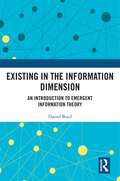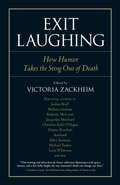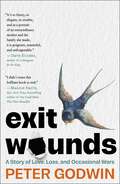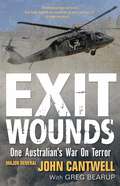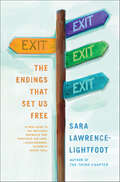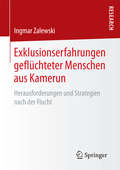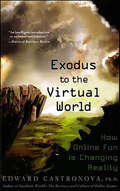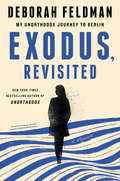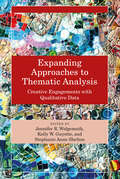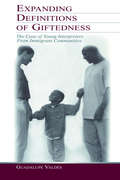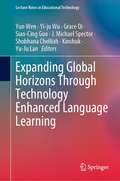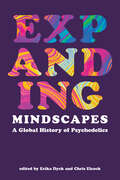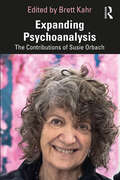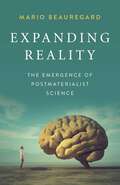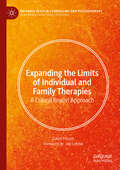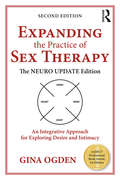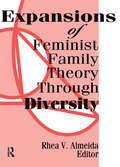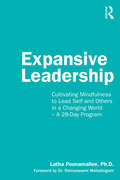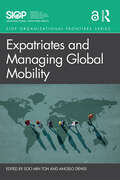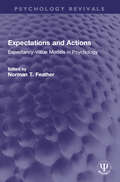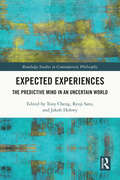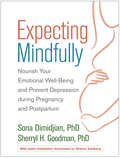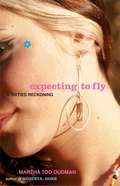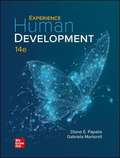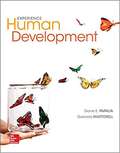- Table View
- List View
Existing in the Information Dimension: An Introduction to Emergent Information Theory
by Daniel BoydThis book presents new insights into the nature of the human mind as a product of the brain. It does so by discussing how biological and technological information systems differ from their counterparts with physical functions, presenting Emergent Information Theory as a solution to the mind-body problem and overarching framework for all biological and technological information systems.Emergent Information Theory is a new theoretical approach to the specific type of information and emergence exploited by biological neural networks and digital systems. One of the conclusions of this theory is that these entities and processes are non-physical and exist in an information dimension connected to but distinct from the three dimensions of physical space. It is in this information dimension that our minds exist, making it ultimately more our home as sentient beings than the physical realm inhabited by our bodies. This book presents existing scientific and philosophical evidence that leads to this conclusion, followed by application of the theory to biological and technological information systems. The author concludes with a call to action for further research.This fascinating text will be of interest to any researcher of consciousness, the mind-body problem, or AI, as well as those working in related areas such as physical neuroscience and systems theory.
Exit Laughing
by Victoria ZackheimExit Laughing is more than a collection of twenty-four personal stories, written by some of our country's finest authors, on the subject of death and humor. It's a reminder that all of us approach death in very different ways. Whether we face our death or the death of a loved one with fear, sorrow, joy, or confusion, and whether or not we believe in an afterlife, we cannot deny that death happens. Exit Laughing reminds us that in death there is a place for humor. Ellen Sussman writes of flying home her mother's body and watching her mother's burial wardrobe spill out on the baggage carousel. Kathi Kamen Goldmark regales us with memories of playing the kazoo at Jessica Mitford's funeral. Broadway and television actor Richard McKenzie shares the riotous story of a funeral procession led by a lost hearse. Bonnie Garvin writes about her parents' double suicide attempt (and yes, it's funny!). Joshua Braff recalls a death in an upstairs bedroom during his childhood, Roadrunner cartoons included. L.A. Law star and author Michael Tucker describes his last visit with his dying friend, Cleavon Little, and how they said goodbye. International bestselling novelist Jacquelyn Mitchard writes about her husband's untimely death, and how his three best friends ended up held in a psychiatric hospital after the wake. These stories, along with seventeen other memorable essays, constitute a book whose purpose is to remind readers that when dealing with illness, dying, and death, there is an important place for laugh-out-loud humor.
Exit Wounds: A Story of Love, Loss, and Occasional Wars
by Peter GodwinAward-winning writer Peter Godwin brings his &“moving&” (The Sunday Times, London) voice to his latest memoir about his evolving relationships with the women and places that shaped his life.Peter Godwin&’s mother is dying. Born in England, and having spent most of her adult life as a doctor in Zimbabwe, she now lies on a hospital bed in the partitioned living room of his sister&’s London home. Peter has spent his life missing his Zimbabwean childhood, a longing that does not diminish as he reflects on his time as a journalist on the frontlines of combat around the world, or life in New York with his English wife and transatlantic children. In his mother&’s final months, he must come to terms with everything his family was and wasn&’t: the secrets they kept from one another, the stoicism that sometimes threatened to destroy them, and the beauty of the wildly different places they called home. With generations of history behind him, Godwin lyrically brings us into the spaces which make us question and suffer, shows us how we can heal our own scars, and celebrate the lives we have among family and friends.
Exit Wounds: One Australian's War On Terror: Updated Edition
by Greg Bearup Major General John CantwellJohn Cantwell, Queensland country boy, enlisted in the army as a private and rose to the rank of major general. He was on the front line in 1991 as Coalition forces fitted bulldozer blades to tanks and buried Iraqi troops alive. He served in Baghdad in 2006 and saw what a car bomb does to a crowded marketplace. He was commander of Australian forces in Afghanistan in 2010 when ten of his soldiers were killed. He came home in 2011 to be considered for the job of chief of the Australian Army. Instead, he ended up in a psychiatric hospital. Exit Wounds is the deeply human account of one man's tour of the War on Terror, the moving story of life on a modern battlefield: from the nightmare of cheating death in a field strewn with mines, to the utter despair of looking into the face of a dead soldier before sending his body home to his mother. Cantwell hid his post-traumatic stress disorder for decades, fearing it would affect his career. Australia has been at war for the past twenty years and yet there has been no stand-out account from these conflicts - Exit Wounds is it. Raw, candid and eye-opening, no one who reads this book will be unmoved.
Exit: The Endings That Set Us Free
by Sara Lawrence-LightfootFrom a renowned sociologist, the wisdom of saying goodbyeSara Lawrence-Lightfoot is enthralled by exits: long farewells, quick goodbyes, sudden endings, the ordinary and the extraordinary. There's a relationship, she attests, between small goodbyes and our ability "to master and mark the larger farewells."In Exit, her tenth book, she explores the ways we leave one thing and move on to the next; how we anticipate, define, and reflect on our departures; our epiphanies that something is over and done with. Lawrence-Lightfoot, a sociologist and a professor at the Harvard Graduate School of Education, has interviewed more than a dozen women and men in states of major change, and she paints their portraits with sympathy and insight: a gay man who finds home and wholeness after coming out; a sixteen-year-old boy forced to leave Iran in the midst of the violent civil war; a Catholic priest who leaves the church he has always been devoted to, he life he has loved, and the work that has been deeply fulfilling; an anthropologist who carefully stages her departure from he "field" after four years of research; and many more.Too often, Lawrence-Lightfoot believes, we exalt new beginnings at the expense of learning from our goodbyes. Exit finds wisdom and perspective in the possibility of moving on and marks the start of a new conversation, to help us discover how we might make our exits with purpose and dignity.
Exklusionserfahrungen geflüchteter Menschen aus Kamerun
by Ingmar ZalewskiWährend in den gegenwärtigen Debatten um Flucht und Asyl vorwiegend über Geflüchtete gesprochen wird, liefert Ingmar Zalewski einen empirischen Beitrag aus der Perspektive der Betroffenen. Er stellt dar, wie Menschen aus Kamerun während ihres Asylverfahrens durch Benachteiligungen, Bevormundungen sowie alltagsrassistische Erfahrungen in einen Strudel sozialer Exklusionsmechanismen geraten. Datengrundlage ist ein mehrmonatiger Aufenthalt in einem Brandenburger Geflüchtetenheim, im Zuge dessen die Subjektperspektive der Geflüchteten durch teilnehmende Beobachtungen und qualitative Einzelinterviews erschlossen wurde. Diese sozialpsychologische Feldstudie liefert einen Debattenbeitrag, der sich einem vereinseitigten Verständnis von Integration entzieht und eindringlich die Frage nach gesellschaftlicher Teilhabe stellt.
Exodus to the Virtual World: How Online Fun Is Changing Reality
by Edward CastronovaVirtual worlds have exploded out of online game culture and now capture the attention of millions of ordinary people: husbands, wives, fathers, mothers, workers, retirees. Devoting dozens of hours each week to massively multiplayer virtual reality environments (like World of Warcraft and Second Life), these millions are the start of an exodus into the refuge of fantasy, where they experience life under a new social, political, and economic order built around fun. Given the choice between a fantasy world and the real world, how many of us would choose reality? Exodus to the Virtual World explains the growing migration into virtual reality, and how it will change the way we live--both in fantasy worlds and in the real one.
Exodus, Revisited: My Unorthodox Journey to Berlin
by Deborah FeldmanThe definitive follow-up to Unorthodox (the basis for the award-winning Netflix series)—now updated with more than 50 percent new material—the unforgettable story of what happened in the years after Deborah Feldman left a religious sect in Williamsburg in order to forge her own path in the world.In 2009, at the age of twenty-three, Deborah Feldman packed up her young son and their few possessions and walked away from her insular Hasidic roots. She was determined to find a better life for herself, away from the oppression and isolation of her Satmar upbringing in Williamsburg, Brooklyn. And in Exodus, Revisited she delves into what happened next—taking the reader on a journey that starts with her beginning life anew as a single mother, a religious refugee, and an independent woman in search of a place and a community where she can belong. Originally published in 2014, Deborah has now revisited and significantly expanded her story, and the result is greater insight into her quest to discover herself and the true meaning of home. Travels that start with making her way in New York expand into an exploration of America and eventually lead to trips across Europe to retrace her grandmother&’s life during the Holocaust, before she finds a landing place in the unlikeliest of cities. Exodus, Revisited is a deeply moving examination of the nature of memory and generational trauma, and of reconciliation with both yourself and the world.
Expanding Approaches to Thematic Analysis: Creative Engagements with Qualitative Data
by Stephanie Anne Shelton Kelly W. GuyotteExpanding Approaches to Thematic Analysis: Creative Engagements with Qualitative Data springboards readers into a world where generating themes from qualitative data is a creative, experimental, and wondrous process!While no one ever said it had to be, thematic analysis is invariably described as a step-by-step process that involves coding. Yet qualitative data analysis is more than a technical procedure—it invokes imagination and inspiration—intuitional engagements that are as vital to the data analysis process as they are difficult to describe. This edited book begins with two premises: (1) there is more than one way to theme data, and (2) qualitative researchers do not have to code to get to themes. Each chapter introduces readers to a different approach to thematic analysis, explores that approach’s theoretical and disciplinary roots, and illustrates how that approach can be used to generate themes. Approaches include annotating, memoing, storying, writing, composing poems, artmaking, meditating, and more, expanding conceptualizations of what themes and thematic analysis can be. The book also includes ‘methodologies in action’: helpful examples of creative theming from doctoral students and early career scholars.This book is as much a provocation for engaging thematic analysis beyond/without/in addition to coding as it is a resource for anyone interested in the rationale, justification, and examples for doing so. As such, it is a source of inspiration for any qualitative student, researcher, and scholar who wishes to expand their repertoire of approaches to thematic analysis.
Expanding Definitions of Giftedness: The Case of Young Interpreters From Immigrant Communities (Educational Psychology Series)
by Guadalupe ValdesThis book is about bilingual young people who have been selected by their families to carry out the hard work of interpreting and translating to mediate communication between themselves and the outside world--between minority and majority communities. It examines the experiences of these young interpreters and the skills they develop in order to fulfill this role. The authors' purpose in this volume is to contribute to extending current definitions of gifted and talented, by proposing and offering evidence that the young people who are selected to serve as family interpreters perform at remarkably high levels of accomplishment when compared with others of their age, experience, and environment, and should thus clearly be included in the 1993 U.S. federal definition of giftedness. They maintain that not only are these capabilities currently overlooked by existing assessment procedures, but also that there is little understanding of the ways in which the unique talents of young interpreters might be nurtured and developed in academic settings. A strong case is made that in order for such students to be identified as gifted on the basis of their bilingual abilities, the field of gifted and talented education must embrace the concept that bilingualism is a strength. The field must also make developing bilingualism a focus of programs designed to meet the needs of the increasingly multilingual student population in the United States. The research this book reports--part of a larger five-year study of giftedness through linguistic and cultural lenses, funded by OERI through the National Research Center on the Gifted and Talented--was conducted by researchers whose background is very much outside the field of gifted education. Rather, their focus is on language, working within the traditions of qualitative sociolinguistics. Thus, this book offers a unique approach to the exploration of giftedness. It asks researchers and practitioners ordinarily accustomed to working with quantitative data to examine and make sense of detailed and rich analyses of students' linguistic performance, and argues that it is only by understanding the challenges of such bilingual interactions that the field of gifted and talented education can expand and reframe its vision of giftedness.
Expanding Global Horizons Through Technology Enhanced Language Learning (Lecture Notes in Educational Technology)
by J. Michael Spector Kinshuk Yun Wen Yi-Ju Wu Grace Qi Siao-Cing Guo Shobhana Chelliah Yu-Ju LanThis book uncovers the important issues in language learning and teaching in the intelligent, digital era. “Social connectivity” is a contemporary style of learning and living. By engaging in the connectivity of physical and digital worlds, how essential parts of language learning and teaching can be achieved? How can the advanced technologies, such as virtual reality and artificial intelligent, be used to solve the problems encountered by language learners? To answer the above mentioned question, plenty of inspiring studies are included in the book. It is a platform of exchange for researchers, educators, and practitioners on the theory and/or application of state-of-the-art uses of technology to enhance language learning.
Expanding Mindscapes: A Global History of Psychedelics
by Erika Dyck and Chris ElcockThe first collection of its kind to explore the diverse and global history of psychedelics as they appealed to several generations of researchers and thinkers.Expanding Mindscapes offers a fascinatingly fluid and diverse history of psychedelics that stretches around the globe. While much of the literature to date has focused on the history of these drugs in the United States and Canada, editors Erika Dyck and Chris Elcock deliberately move away from these places in this collection to reveal a longer and more global history of psychedelics, which chronicles their discovery, use, and cultural impact in the twentieth century.The authors in this collection explore everything from LSD psychotherapy in communist Czechoslovakia to the first applications of LSD-25 in South America to the intersection of modernism and ayahuasca in China. Along the way, they also consider how psychedelic experiments generated their own cultural expressions, where the specter of the United States may have loomed large and where colonial empires exerted influence on the local reception of psychedelics in botanical and pharmaceutical pursuits.Breaking new ground by adopting perspectives that are currently lacking in the historiography of psychedelics, this collection adds to the burgeoning field by offering important discussions on underexplored topics such as gender, agriculture, parapsychology, anarchism, and technological innovations.
Expanding Psychoanalysis: The Contributions of Susie Orbach
by Brett KahrExpanding Psychoanalysis explores the work of the acclaimed psychoanalyst, writer, and activist Susie Orbach.The book studies Orbach’s multifaceted career in five sections, examining her multitudinous contributions to the mental health profession, from the creation of feminist psychotherapy to the enhancement of media psychology, to the growth of political and social consultation. The book contains clinical, historical, and personal chapters, examining Orbach from a range of perspectives. Each chapter investigates a key aspect of Orbach’s work and its impact on the professional, the social, and the personal level. The book concludes with an epilogue by Orbach herself.Expanding Psychoanalysis will be essential for all readers interested in the work of Susie Orbach.
Expanding Reality: The Emergence of Postmaterialist Science
by Mario Beauregard'In Expanding Reality, neuroscientist Mario Beauregard presents the impressive body of scientific evidence that our familiar materialistic model of the world is locked into a sadly outdated 19th-century philosophy. Whether or not you agree with all his conclusions, this courageous book will challenge you to rethink how we see ourselves and our world--and may help usher in a new scientific revolution.' Bruce Greyson, M.D., Carlson Professor Emeritus of Psychiatry & Neurobehavioral Sciences Division of Perceptual Studies, University of Virginia Health SystemReality is much more than the physical world before us. In Expanding Reality, Mario Beauregard examines a variety of phenomena investigated by the most open-minded and visionary scientists. These phenomena provide the evidence that mind, consciousness, and spirit cannot be simply reduced to electrical and chemical activity in the brain.
Expanding the Limits of Individual and Family Therapies: A Critical Realist Approach (Palgrave Texts in Counselling and Psychotherapy)
by David PocockThis book invites individual therapists to think systemically (including issues of social justice) and family therapists to explore a deeper understanding of the individual in contexts, including the domain of the unconscious. Using a critical realist framework, it promotes multiple perspectives—often novel combinations from dissimilar psychotherapy traditions—to expand holistic understanding and provide a richer variety of resources to bring to co-constructed therapeutic encounters. It uses a critical examination of the often-unspoken philosophical underpinnings of psychotherapy practices to re-vision a range of theory and practice considerations—theory choice, the role of science, knowing and not-knowing, emotion in the system, power and autonomy, collaboration and change, and sameness and otherness. All the preceding elements of the book are then brought together in the clinical topics of triangulation, aggressive out-of-control behaviour, and self-harm. Numerous brief case vignettes and longer case examples ensure that theory is always grounded in practice.
Expanding the Practice of Sex Therapy: The Neuro Update Edition—An Integrative Approach for Exploring Desire and Intimacy
by Gina OgdenThe revised edition of this award-winning book offers thirty-three Neuro Updates, which provide evidence-based data to help you recognize and explain the deeply transformational nature of the work. Expanding the Practice of Sex Therapy looks beyond behavioral treatments, pharmaceutical interventions, and performance goals to a comprehensive picture of what your clients want and need when they enter sex therapy, and offers creative ways to engage your clients in their own therapeutic process, whether or not you are trained as a sex therapist. Central to Gina Ogden’s approach is her Four-Dimensional Wheel of Sexual Experience, an innovative template that recognizes the full range of sexual issues: physical, emotional, mental, and spiritual. The text is organized into five practice-oriented sections that introduce the 4-D Wheel; show you how you can use it with individuals, couples, and groups; and encourage you to explore it on your own.
Expansions of Feminist Family Theory Through Diversity
by Rhea AlmeidaExpansions of Feminist Family Theory Through Diversity reconstructs feminist family therapy to include issues of race, class, gender, culture, and sexual orientation. The contributors assist you with creating possible solutions to mental health problems in all types of families. This will enable you to find specific working strategies to help solve the problems inherent in families of diversity. This book also provides you with several conceptual models for approaching the sociopolitical context of family therapy.This collection challenges family therapy as an existing context of power privilege and expands feminist principle and diversity into subject areas such as intimate violence among the racially and sexually different, heterosexual privilege in family life, homosexual and racial oppression, social inequalities within the therapeutic story, and, from Monica McGoldrick, reflections on self as viewed by the multiple social systems of oppression.Clinicians and practicing feminist therapists can find insight into many general topic areas relevant to daily practice, such as: race as a social construct culture in the context of race, class, gender, and sexual orientation assessment and treatment of violence in heterosexual and homosexual families a social critique of therapeutic inequalities addressing the social inequalities in the delivery of mental health the politics of privilege and privacy in family lifeExpansions of Feminist Family Theory Through Diversity is organized in a way that makes it central to all clinical practice. It can be used as a guidebook for family therapists, social workers, counselors (guidance, clergy, and counseling programs) and psychologists who deal with diverse families and their problems.
Expansive Leadership: Cultivating Mindfulness to Lead Self and Others in a Changing World – A 28-Day Program
by Latha PoonamalleeThe structured 28-day mindfulness and contemplative journey presented in this book will help aspiring and current leaders to clarify their identities, and identify and reflect on their mental models to become more expansive leaders. The present moment demands new ways of being, doing, and relating with the world. To meet this moment, we need fresh, collective, inclusive, and interdependent models of leadership and new approaches to leadership development. This book goes beyond the ‘McMindfulness’ often seen in mindful leadership books, to offer a multi-faceted approach to develop a more interconnected sense of self and interdependence-centric mindsets needed for expansive leadership, through mindfulness practice. Through this practice, leaders can cultivate the ability to make deliberate choices using slow thinking and overcome any unconscious and implicit biases that are the result of fast-thinking processes. Anchored in insights from over ten years of teaching mindfulness-based leadership development courses, this book is an invitation to explore how to be a leader in an expansive, inclusive, robust, and resilient way. The reader will have an opportunity to define and refine their identity, uncover their personal mental models, and conclude by developing their own leadership philosophy. Leadership development professionals and teachers can adopt this for their students, coaching, and consulting clients.
Expatriates and Managing Global Mobility (SIOP Organizational Frontiers Series)
by Angelo DeNisi Soo Min TohMultinational enterprises continue to rely heavily upon expatriates as part of their global workforce. These expatriates, whose exact employment contract may take different forms, are assigned to help them develop global skills as well as to foster knowledge transfer. But managing this expatriate workforce is extremely complex, requiring a questioning of assumptions and sensitivity to new social and cultural dynamics. This book sets out to examine the problem of expatriate management through an I/O Psychology lens. Each chapter draws upon the expertise of scholars from around the world to provide insights into the latest research findings and remaining needs, pertaining to a wide variety of issues. The contributors of this book review the current state of the research of the issue at hand and then make recommendations for where the new frontiers of the research should be in the coming decades. This volume covers four sets of issues pertaining to expatriate management and global mobility in depth. First, the different decision points organizations must make about assigning someone to an overseas location for some period of time; second the different categories of employees in the multinational corporation and their unique characteristics and challenges; third, the various issues and implications of managing a globally mobile workforce; and fourth, the unique contexts of global mobility. Overarching future research themes are identified that lay out the research agenda for the coming decades. By bringing together key research, this book aims to help I/O psychologists understand, explore, and identify new ways of contributing to the understanding of the issues involved in managing an expatriate workforce. Incorporating state-of-the art I/O psychology research in this unique context bears the promise of yielding important new paradigms and practices.
Expectations and Actions: Expectancy-Value Models in Psychology (Psychology Revivals)
by Norman T. FeatherOriginally published in 1982, this book examines the current status of expectancy-value models in psychology. The focus is upon cognitive models that relate action to the perceived attractiveness or aversiveness of expected consequences. A person’s behavior is seen to bear some relation to the expectations the person holds and the subjective value of the consequences that might occur following the action. Despite widespread interest in the expectancy-value (valence) approach at the time, there was no book that looked at its current status and discussed its strengths and its weaknesses, using contributions from some of the theorists who were involved in its original and subsequent development and from others who were influenced by it or had cause to examine the approach closely. This book was planned to meet this need. The chapters in this book relate to such areas as achievement motivation, attribution theory, information feedback, organizational psychology, the psychology of values and attitudes, and decision theory and in some cases they advance the expectancy-value approach further and, in other cases, point to some of its deficiencies.
Expected Experiences: The Predictive Mind in an Uncertain World (Routledge Studies in Contemporary Philosophy)
by Jakob Hohwy Tony Cheng Ryoji SatoThis book brings together perspectives on predictive processing and expected experience. It features contributions from an interdisciplinary group of authors specializing in philosophy, psychology, cognitive science, and neuroscience. Predictive processing, or predictive coding, is the theory that the brain constantly minimizes the error of its predictions based on the sensory input it receives from the world. This process of prediction error minimization has numerous implications for different forms of conscious and perceptual experience. The chapters in this volume explore these implications and various phenomena related to them. The contributors tackle issues related to precision estimation, sensory prediction, probabilistic perception, and attention, as well as the role predictive processing plays in emotion, action, psychotic experience, anosognosia, and gut complex. Expected Experiences will be of interest to scholars and advanced students in philosophy, psychology, and cognitive science working on issues related to predictive processing and coding.
Expecting Mindfully: Nourish Your Emotional Well-Being and Prevent Depression during Pregnancy and Postpartum
by Sona Dimidjian Sherryl H. GoodmanUnlike other mindfulness resources for moms and moms-to-be, this compassionate book is grounded in mindfulness-based cognitive therapy, a proven program. The authors are leading experts on the emotional challenges of pregnancy and early parenting--and how to overcome them. Guided meditations and gentle yoga practices help you build crucial skills to prevent depression, ease anxiety, and minimize stress during this unique and important phase of your life. Clear suggestions for how to follow the program day by day are accompanied by moving reflections from a "circle of mothers" working through the same steps. In a convenient large-size format, the book features journaling exercises and other practical tools (you can download and print additional copies as needed). The companion website also includes audio downloads narrated by renowned meditation teacher Sharon Salzberg, plus video clips of prenatal yoga practices.
Expecting to Fly
by Martha Tod DudmanDO YOU REMEMBER WHAT IT FELT LIKE TO BE FIFTEEN? MARTHA TOD DUDMAN DOES. It starts with a blue hash pipe in a shabby field and a hot, tight dance at the Mayflower Hotel, and rapidly accelerates against the kaleidoscopic backdrop of the Sixties. Describing a time weirdly similar to today, Expecting to Fly recalls a conservative government embroiled in an increasingly unpopular war, racial tensions, and a generation of disillusioned young people looking for something meaningful to believe in -- teenagers who, like Dudman, hurled themselves into a sea of drugs and sex they weren't really ready for. With the same passion and brutal honesty that she brought to her first book, Augusta, Gone -- the story of her daughter's troubled adolescence -- Dudman re-creates her own wild ride through the turbulent Sixties, vividly recounting scenes you probably experienced yourself. From the prim tradition of a posh girls' school and debutante parties of Washington, D.C., to the snows of New Hampshire and the campaign for Eugene McCarthy, from living out of a knapsack in Spain to getting stoned on acid in Yellow Springs, Ohio, Expecting to Fly takes us on a blistering trip to a time when the only thing you couldn't be was shocked. Now, years later, Dudman reflects on that time and what it means: "Which was it -- triumph, exploration, some important journey, or just a big stupid mistake, a total waste of time?" You decide.
Experience Human Development
by Diane E. Papalia Gabriela MartorellExperience Human Development helps students experience the human side of development by exposing them to culture and diversity, immersing them in practical application, and helping them study smarter through personalized learning and reporting. It takes a practical approach to research and recognizes that just as people develop in their own way, your students also learn in their own ways.
Experience Human Development
by Diane E. Papalia Gabriela Martorell Ruth Duskin FeldmanExperience the human side of development. Papalia helps students experience the human side of development by exposing them to culture and diversity, immersing them in practical application, and helping them study smarter through personalized learning and reporting.
